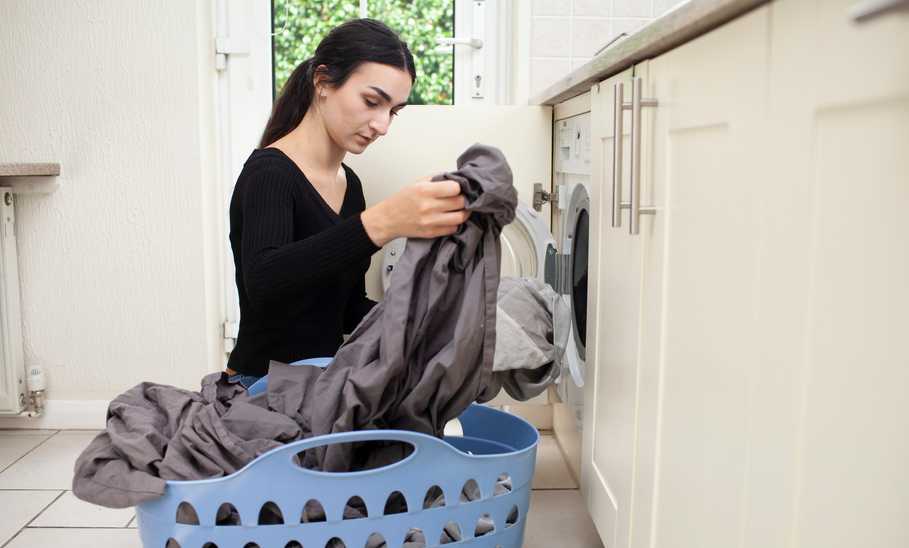How Often Should You Wash Your Sheets? A Guide to a Cleaner Bed

Our evaluations and opinions are not influenced by our advertising relationships, but we may earn a commission from our partners’ links. This content is created by TIME Stamped, under TIME’s direction and produced in accordance with TIME’s editorial guidelines and overseen by TIME’s editorial staff. Learn more about it.
Since you spend eight hours or more tucked away in your bed at night, your sheets collect quite a bit more grime than you may expect. There’s sweat, body oils, dust, and too much more to contemplate. Even if you think you’re up on your chore routine, a less-than-fresh set of sheets can impact your sleep quality (and health, if you neglect washing them for too long). Here’s everything you need to know about the care and cleaning of your bedding.
The last thing on your mind when you wake up in the morning is the state of your sheets. (Especially if you’re not in the routine of making your bed in the morning.) In a nutshell, you should wash your bed sheets and pillowcases once a week, or every other week at the very least. Regularly washing your sheets prevents odors, maintains their plush texture, and keeps them getting worn out from repeated use night after night.
You might be surprised when you learn about what can be found between your sheets if you extend time between washes:
Related to spiders and ticks, and invisible to the naked eye without a microscope, dust mites are attracted to and feed on the dead skin cells we continuously shed while we sleep. This makes unwashed bed sheets especially appealing to colonies of dust mites, which is a problem because these tiny creatures and their waste cause severe allergic reactions including sneezing, itchy eyes, and asthmatic symptoms. Thankfully, washing sheets in hot water is one of the best ways to eliminate dust mites from your bedroom.
Even if you take a shower right before bed, your body will naturally shed sweat, dead skin cells, and body oil throughout the night, and it’ll all be absorbed into your sheets. Not only will this give them a grimier feel over time, unwashed sheets may cause skin irritation, infections, or an allergic reaction because they are so alluring for dust mites.
If you eat in bed, you’re dropping more insect-attracting crumbs in your sheets and bedroom than you probably realize. Also, if your pet has the privilege of sleeping on your bed, they’re tracking dirt, dust, kitty litter, and trace amounts of waste from their paws onto your sheets.
If you let your sheets sit on your bed for weeks on end, you’ll risk more than simply feeling uncomfortable under grubby sheets. Outside of the unpleasant feel of dirty sheets on your skin and restless sleep, there are serious health risks that come from snoozing on an unclean bed.
Since bed sheets actively absorb your body oils and sweat, it’s far too easy for the bacteria that feed on these substances to spiral out of control as they reproduce on your unclean bed. Some of the side effects of sleeping in sheets contaminated with high bacterial levels include clogged pores and severe acne, itchiness, rashes, and eczema-related issues.
Neglected sheets will eventually promote the growth of bacteria and fungi that can easily give you a range of nasty skin infections, such as athlete’s foot, a staph infection, a yeast infection, or toenail fungus. Maintaining the cleanliness of your sheets is much easier than dealing with doctor’s visits, and being forced to take strong antifungal or antibacterial medication to recover.
These tiny arachnids are already drawn to your shed skin particles, and when they accumulate within your unwashed sheets, your local dust mite population can quickly explode to between one and two million individuals or more in your bed. Not only is it gross to imagine millions of bugs climbing, eating, and leaving their waste on you all night, a swarm of dust mites can cause coughing, a runny nose, and make it difficult for allergy sufferers to fall and stay asleep.
![[object Object] [object Object]](https://i5.walmartimages.com/asr/b686d07f-06f3-464d-ae61-89dec8f10516.831f7fc8ce10cb28f97710373c7cb5f0.jpeg)
Always check the maintenance instructions on your sheets before attempting to wash them. Different fabric types such as linen, cotton, and bamboo sheets all have their own special do’s and don’ts to preserve their color, keep them feeling their softest, and to ensure they last for years to come.
Wash your sheets at the highest temperature that’s safe for its fabric with a gentle detergent. This will kill the bacteria and dust mites living on the sheets, and it is a good practice to avoid bleach and fabric softeners, as they will noticeably reduce the absorbency of your sheets.
Tumble dry your sheets on a low heat setting to avoid wrinkling and shrinking them. You want your sheets to last—and fit on your mattress for a long time to come.
Unfortunately, some pillows simply aren’t machine-safe, however if the manufacturer notes it’s safe to throw them in the wash, we recommend doing so every couple of months. Consider washing them more often if you tend to sweat in your sleep—a common reason why pillows turn yellow. Pillowcases should be washed alongside your sheets, and just as frequently. For further advice, check out our guide on how to wash pillows.
![[object Object] [object Object]](https://i5.walmartimages.com/seo/Sleep-Innovations-Contour-Memory-Foam-Pillow-Standard-Size-Cervical-Support-Pillow-for-Sleeping-5-Year-Warranty_4deff7b8-8fa1-4edd-8e98-f83e6da98add.6309c203b5aa9debfa5813b75b2d3479.jpeg)
Like sheets, be sure to check the maintenance tags of your blankets and comforters before washing them, and they should also be cleaned every one to two. Since washing a comforter can be inconvenient, consider investing in a quality allergen-proof cover so that you only have to throw the cover into the laundry. You can also see if your local dry cleaner or laundry service offers comforter cleaning.

Even the best mattresses need to be thoroughly cleaned twice a year to keep the dust mites and potential odors at bay. Remove all of the bedding and use a vacuum attachment across its surface and along every crevice of your mattress. Sprinkle baking soda across the entire mattress to deodorize it for several hours and vacuum it up afterward. If you notice any stains or discoloration, apply a tiny dab of dish soap, hydrogen peroxide, or baking soda to a cloth and gently scrub the area until the area has been treated. (For more cleaning advice, check out our guide on mattress stain removal.) Let the mattress dry completely before remaking the bed.
Remember, if you regularly wake up sore or tired, feel hot and sweaty when you get in bed, or your mattress is at least eight years old, it’s likely time to replace your mattress.

If you’re serious about your health and cleanliness, there are many useful ways to keep your sleeping quarters fresh, hygienic, and tidy. The best part is that each of these simple tasks are a snap to incorporate into your daily schedule:
The easiest and most important thing you should do to maintain a clean sleeping space is to consistently wash your sheets every week, rotating between a few sheet sets. This will minimize bacteria and dust mite growth, remove dust, dirt, and the natural sweat, oils, and skin cells you shed every night, and go a long way towards providing you with a crisp and cool night’s sleep.
Despite what your parents may have told you, it’s better to air out your bed when you first wake up in the morning and to make it later in the day. This practice helps to inhibit the growth of bacteria between washings.
In addition to manually cleaning your bed’s sheets, pillows, and mattress, there are a few other techniques to keeping a pristine sleeping space, including:
The longer you go without washing your sheets, the quicker your dirty sheets promote the growth of odor and disease-causing bacteria and allergy-causing dust mites. Everyone should wash their sheets and pillowcases once a week, or every other week at the latest.
No. Bed bugs are attracted to human blood, not dirty bed sheets, however you can infest your mattress with biting bed bugs by visiting bed bug-contaminated areas and accidentally bringing them home on your clothes or luggage, or bringing home used plush toys, bedding, or clothes without washing them first.
Unwashed sheets are far more likely to attract smelly and harmful bacteria, allergy-aggravating dust mites, and cockroaches if you regularly eat in bed without cleaning up afterward.
For the vast majority of bed sheets, absolutely! Although linen, cotton, and polyester sheets are generally drier-safe, other fabrics such satin or silk may not be able to survive a trip through the drier.
Always read the maintenance tag before washing or drying your home’s best sheets, and if you are unsure if your sheets are drier-safe, feel free to hang them to dry in a well-ventilated open space away from direct sunlight. Be sure to put away your sheets as soon as the drier has run its cycle to prevent unsightly wrinkles!
Read Article: Best Down Comforters: 8 Cozy Options for Every Kind of Sleeper
The information presented here is created by TIME Stamped and overseen by TIME editorial staff. To learn more, see our About Us page.



